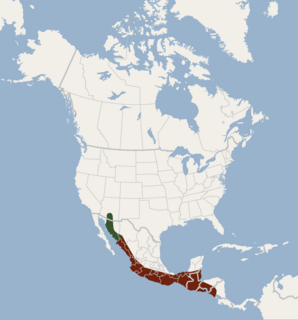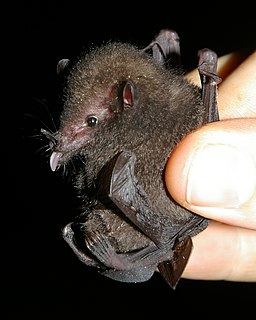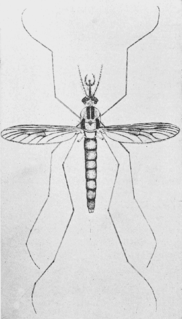
The Arizona bark scorpion is a small light brown scorpion common to the Sonoran Desert in the southwestern United States and northwestern Mexico. An adult male can reach 8 cm in length (3.14 inches), while a female is slightly smaller, with a maximum length of 7 cm (2.75 inches).

Underwood's bonneted bat is a species of bat in the family Molossidae found in Belize, Costa Rica, El Salvador, Guatemala, Honduras, Mexico, Nicaragua and the southwestern United States.

Underwood's long-tongued bat is a species of bat in the family Phyllostomidae. It is monotypic within the genus Hylonycteris. It is found in Belize, Guatemala, Mexico, Nicaragua, and Panama.

The Buthidae are the largest family of scorpions, containing about 80 genera and over 800 species as of mid-2008. Its members are known as, for example, fat-tailed scorpions and bark scorpions. A few very large genera are known, but a high number of species-poor or monotypic ones also exist. New taxa are being described at a rate of several to several dozen new species per year. They occur in the warmer parts of every major landmass on Earth, except on New Zealand. Together with four other families the Buthidae make up the superfamily Buthoidea. The family was established by Carl Ludwig Koch in 1837.

Centruroides is a genus of scorpions of the family Buthidae. Several North American species are known by the common vernacular name bark scorpion. Numerous species are extensively found throughout the southern United States, Mexico, Central America, the Antilles and northern South America. Some are known for their interesting patterning or large size ; most if not all fluoresce strongly under ultraviolet illumination, except after moulting. They contain several highly venomous species, and fatalities are known to occur. The venom of the Mexican scorpion Centruroides limpidus limpidus contains the neurotoxins Cll1 and Cll2.
Centruroides farri is a species of scorpion in the family Buthidae.
Centruroides marcanoi is a species of scorpion in the family Buthidae.
Centruroides sissomi is a species of scorpion in the family Buthidae.
Centruroides barbudensis is a species of scorpion in the family Buthidae.
Centruroides flavopictus is a species of scorpion in the family Buthidae. It is native to Mexico.
Centruroides fulvipes is a species of scorpion in the family Buthidae. It is native to Mexico.
Centruroides nigrescens is a species of scorpion in the family Buthidae. It is native to Mexico.

Centruroides ochraceus is a species of scorpion in the family Buthidae. It is native to Mexico.
Centruroides baergi is a species of scorpion in the family Buthidae.
Centruroides chamulaensis is a species of scorpion in the family Buthidae. It is native to Mexico.
Centruroides tecomanus is a species of scorpion in the family Buthidae. It is native to Mexico.
Ergtoxin is a family of toxins that can be isolated from the venom of several members of the Mexican scorpion genus of Centruroides. These toxins target hERG potassium channels.

Eucorethra underwoodi is a species of phantom midges.
Sphaerodactylus underwoodi, also known commonly as Underwood's least gecko or the Turks Islands geckolet, is a small species of lizard in the family Sphaerodactylidae. The species is endemic to Grand Turk Island.

Cecil F. Underwood was a British scientific collector of mammal and bird specimens in Central America.







